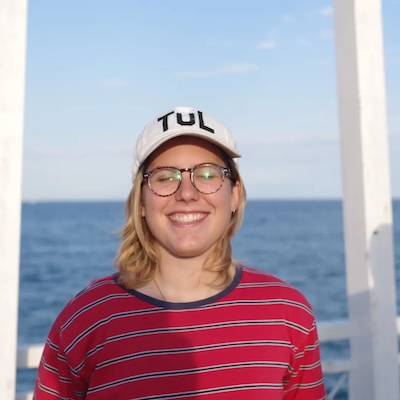
Elizabeth J. Wenger
Contest - Flash CNF
Elizabeth J. Wenger is a queer, Jewish writer from Tulsa, Oklahoma. Her works have been nominated for the Pushcart Prize and Best of the Net Anthology. Currently an MFA student at Iowa State University, Wenger is writing a collection of essays about animals and violence. Her website is wengerwrites.com. You can find her on instagram @wengerwow.
A Goat
When we arrived at my aunt’s house, a hole had already been dug. Feed had been laid in it to give the goat something to chew on before my dad stuck a bullet in its old, piebald head.
—My dad, who pulled stitches from me three times, (knuckle, finger, lip) but always refused to put them in, saying a doctor never works on his own kid. The same man who drunkenly sewed his own skin after he dropped a beer bottle that sent glass flying across the cement floor and sliced his foot wide open. I remember driving to his office with my mom at the wheel, laughing at my dad’s slurred insistence that he was sober enough to sew his own foot. And he did. He did it perfectly.
He had a different voice when on the phone with his patients, a voice of slow authority, of kind inquisition, of it-will-be-all rights, of let’s-figure-this-outs. He fell into our storm shelter once, climbed out, and went two days before surmising he’d broken several ribs and spine bones, but didn’t do a thing about it, because, as he taught me, sometimes when you get hurt, the only cure is patience. This man purred to our cats; cried when he drowned our turtles by accident, forgetting to pull the hose from the tank; and kept pet iguanas until my brother was born and my mom decided they couldn’t have babies and lizards under the same roof.
When my aunt took the goat in, he was already old, already failing, already blind, and one day his leg just gave out and he couldn’t walk any longer and there was not a thing any of us could do, because at that age if you fix one leg, the other will quit, and if you fix that, then the fur will fall out, or the liver will fail. There is a point when things are just too broken and the breaking is less a thing to fix than a sign of coming loss.
So my aunt called him that day to shoot her goat as a favor because she and her husband loved the thing too much to do it themselves, even though my dad can’t really shoot a gun, not like a cop, not like a soldier, not like an executioner, but because my dad is a practical man who knows the paradoxes of healing, the ironies of mercy. Because my dad wouldn’t hurt a fly unless the fly was already drowning. Because sometimes you have to kill a suffering thing, if you want to do it any good.
So my uncle, a better shot, but too close to the target, gave my dad a gun, they put the goat in the hole they’d dug, and my dad told me to stay in the car until he came to get me. And so I went to the car and slid the door shut and waited for the thing to be done. I don’t know what took him so long shooting a fragile thing in its own grave, but I imagine him focusing, wanting so bad to get it right, in one shot, because more than one shot would be cruelty.
And it was so long I waited in that van, fiddling around with whatever loose papers floated under the seats and I wanted to see maybe—maybe just a little—I wanted to see it happen.
So I opened the door too soon and as I did, I heard the gunshot. It rang out sharp and I shut the door again and let myself cry until I heard my dad coming, clear-eyed and serious, to the car.
